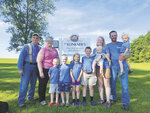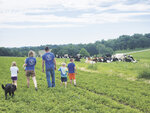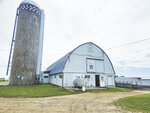


CASHTON, Wis. — Ben Klinkner was sure he would never milk another cow when he left home for college at 18 years old. While he was earning his master’s degree, however, his dad asked him if he wanted to come back. Ben’s girlfriend at the time, Erin, thought dairy farming with his parents sounded OK.
Ten years and six kids later, Ben and Erin Klinkner are amid a good farm transition.
“We had the opportunity from Mom and Dad and Erin made it an option as well,” Ben said. “Being able to spend time with your family every day versus me being on the road or doing business type stuff instead, the money is not worth that. So here we are.”
Ben and Erin milk 55 organic cows near Cashton with Ben’s parents, Paul and Geralyn. The land has been in the Klinkner family for over a century.
Paul and his brother, Gerald, have farmed side by side since their own father got them started when they were young. Paul said it is important for him to pass on what his father helped him do.
“My dad helped my brother and I get started and I just wanted to help out somebody too,” Paul said. “Geralyn and I worked for a long time to get it where it’s at, so we’d like to see it go on.”
Paul and Gerald have always had their own separate herds but collaborated efforts on everything else. Now that Ben is taking over from Paul, and Gerald’s son, Dillan, is taking over from Gerald, the collaboration continues to be helpful.
That communal mindset is what led to the Klinkners becoming organic 24 years ago. Gerald decided to try it, so Paul did too. It was an adjustment at the time, to farm differently than all the neighbors and differently than his father had farmed, Paul said. They were shipping milk to Westby Cooperative Creamery, which did not have an organic market at the time. They got on the waiting list for Organic Valley and did the three-year transition to achieve organic certification.
Eventually, Westby Creamery opened an organic market and the Klinkners were able to ship milk to the processor again in 2007.
Today, Paul and Ben farm 300 acres. Ben and Erin moved into the farmhouse two years ago, while Paul and Geralyn moved to a nearby home off the farm. Paul still comes to help with both milkings when he is not in the fields. Erin manages calf chores as well as a large garden and cares for their six children. They also have horses, chickens and pigs.
Ben and Erin have been able to slowly take ownership of the business. They began by working for a wage, and they progressed to purchasing some of the cattle and receiving a percentage of the milk check. As they purchased more cattle, their percentage grew. At the end of this year, they will own all the cattle. They have also purchased the farm they live on through a land contract and started to help buy machinery.
Ben said he is grateful for the opportunity to join the operation in phases.
“We wouldn’t be able to do this without Mom and Dad,” Ben said. “For young people to start in the industry is a huge challenge financially but then you add in the labor factor, I feel it’s almost impossible to do.”
In 24 years of farming organically, the family said the drought last year was the most interesting year they have seen. Ben said he noticed the healthier soil handled the dry weather well. They normally control weed pressure with a flamer. They skipped that last year because their corn had not seen rain since planting, but they ended up regretting it since weed pressure was higher than ever.
“Last year we didn’t flame because it was too dry and this year I finished flaming when it was raining,” Ben said.
Even with more weeds, however, Ben said last year was the first time he ever thought their organic corn looked better than some conventional corn in the area.
They all agree that the organic practices have positive effects on the cattle as well.
“I believe the animals benefit from being organic,” Ben said. “We’re not stressing them out too much; we need them to last.”
While the land and health benefits are appreciated, Paul said the community makes it even more worthwhile.
“You’re in a nice group of like-minded people,” Paul said. “And then there’s the premium on the milk which has got to be a plus.”
Comments
No comments on this item Please log in to comment by clicking here